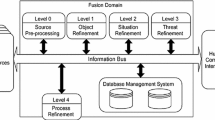Abstract
In this paper, the features of semantic complex event processing (SCEP) approach based on the metagraph model is considered. The idea of event and event processing is one of the fundamental ideas in the fields of complex systems and software engineering. The definitions and descriptions of Complex Event Processing (CEP) and semantic complex event processing (SCEP) are reviewed and summed up. Semantic Web technologies are typically used for semantics description in SCEP approach. Complex event processing combines data from multiple sources. Complex event processing engine may include several processing levels, and semantic complex events may be enriched during processing. The goal of complex event processing is to identify meaningful events (such as opportunities or threats) in the form of the complex situation. Complex event processing engine may use global ontology and static and dynamic semantics. The RDF approach has limitations in describing complex situations, while the metagraph approach addresses RDF limitations in a natural way without emergence loss. The metagraph model is used as a unified model for semantic events description (static and dynamic semantics), complex situation description, global ontology description. Using the combination of the metagraph data model and metagraph agents model it is possible to construct the complex semantic event processing engine in the form of the hierarchy of dynamic metagraph agents.
Access this chapter
Tax calculation will be finalised at checkout
Purchases are for personal use only
Similar content being viewed by others
References
Chandy Mani K (2006): Event-driven applications: costs, benefits and design approaches. Gartner application integration and web services summit 2006
Ushakov V, Samsonovich A (2015) Toward a BICA-model-based study of cognition using brain imaging techniques. Procedia Comput Sci 71:254–264
Choi D, Langley P (2018) Evolution of the icarus cognitive architecture. Cognitive Syst Res 48:25–38
Luckham D (2012) Event processing for business: organizing the real-time enterprise. John Wiley & Sons, Hoboken
van der Aalst W (2016) Process mining: data science in action. Springer, Berlin
Keskisarkka R (2014): Semantic complex event processing for decision support. In: Proceedings of 13th international semantic web conference – ISWC 2014, pp. 529–536. Springer, Riva del Garda, Italy
Zhou Q, Simmhan Y, Prasanna V (2017) Knowledge-infused and consistent complex event processing over real-time and persistent streams. Future Gener Comput Syst 76:391–406. https://doi.org/10.1016/j.future.2016.10.030
Teymourian K (2016) Knowledge-based complex event processing: concepts and implementation. Südwestdeutscher Verlag für Hochschulschriften, Saarbrücken
Basu A, Blanning R (2007) Metagraphs and their applications. Springer, New York
Chernenkiy V, Gapanyuk Yu, Nardid A, Gushcha A, Fedorenko Yu (2017) The hybrid multidimensional-ontological data model based on metagraph approach. In: Petrenko A, Voronkov A (eds) Perspectives of system informatics, LNCS, vol 10742. Springer, Moscow, pp 72–87
Defining N-ary Relations on the Semantic Web. W3C Working Group Note 12 April 2006. http://www.w3.org/TR/swbp-n-aryRelations. Accessed 06 May 2019
Chernenkiy V, Gapanyuk Yu, Nardid A, Skvortsova M, Gushcha A, Fedorenko Yu, Picking R (2017): Using the metagraph approach for addressing RDF knowledge representation limitations. In: Proceedings of internet technologies and applications (ITA’ 2017), Wrexham, United Kingdom, pp. 47–52
Lieto A, Lebiere C, Oltramari A (2018) The knowledge level in cognitive architectures: Current limitations and possible developments. Cognitive Syst Res 48:39–55
Author information
Authors and Affiliations
Corresponding author
Editor information
Editors and Affiliations
Rights and permissions
Copyright information
© 2020 Springer Nature Switzerland AG
About this paper
Cite this paper
Gapanyuk, Y.E. (2020). The Semantic Complex Event Processing Based on Metagraph Approach. In: Samsonovich, A. (eds) Biologically Inspired Cognitive Architectures 2019. BICA 2019. Advances in Intelligent Systems and Computing, vol 948. Springer, Cham. https://doi.org/10.1007/978-3-030-25719-4_13
Download citation
DOI: https://doi.org/10.1007/978-3-030-25719-4_13
Published:
Publisher Name: Springer, Cham
Print ISBN: 978-3-030-25718-7
Online ISBN: 978-3-030-25719-4
eBook Packages: Intelligent Technologies and RoboticsIntelligent Technologies and Robotics (R0)




